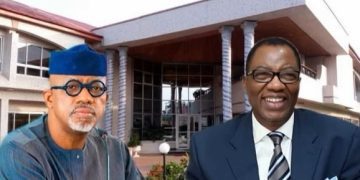By Jane Okafor, Abuja
The government of Japan has named the city of Kisarazu as the hometown for Nigerians willing to live and work in the country as part of its strategic efforts to deepen cultural diplomacy, promote economic growth and enhance workforce productivity.
With this new partnership, announced on the sidelines of the 9th Tokyo International Conference for African Development, the Japanese government will create a special visa category for highly skilled, innovative, and talented young Nigerians who want to move to Kisarazu to live and work.
Abiodun Oladunjoye, State House Director of Information, who disclosed this on Friday, stated that the announcement was made by the Japanese government on Thursday.
According to Oladunjoye, artisans and other blue-collar workers from Nigeria who are ready to upskill will also benefit from the special dispensation visa to work in Japan.
The Daily Crucible reports that Japan International Cooperation Agency also designated at three other cities in the country as “hometowns” for certain other nations in Africa at the 2025 Tokyo International Conference on African Development (TICAD).
The agency, which assists with implementing development assistance in developing countries, assigned the city of Nagai in Yamagata Prefecture to Tanzania, Sanjo in Niigata Prefecture to Ghana and Imabari in Ehime Prefecture to Mozambique.
Through the arrangement, Japan looks to strengthen exchanges with the respective African countries by officially connecting municipalities that already have existing relations with those nations.
Having such ties that serve as a foundation for two-way exchanges of human resources will contribute to Japan’s national interest in fostering personnel who can be a link to Africa, given expectations that the continent’s population will play a key role in global development as it continues to grow.
Local authorities expect that the designations would lead to an increase in their cities’ populations, which would contribute toward their regional revitalization efforts.
Discussions among the related parties, such as the mayors of the cities and embassy representatives from Nigeria and three other countries, were held on Thursday during the three-day run of TICAD.
The event, which first began in 1993 as an international conference centering on the theme of development in Africa, marked its ninth opening in Yokohama on Wednesday. The previous conference was held in Tunisia in 2022.
Through the arrangement, Japan looks to strengthen exchanges with the four African countries by officially connecting municipalities with existing relations with those nations.
Nigeria’s Charge d’Affaires, Mrs. Florence Akinyemi Adeseke, also the Acting Ambassador to Japan, and Yoshikuni Watanabe, the Mayor of Kisarazu, received the certificate from the Japanese government naming Kisarazu the hometown of Nigerians.
The four cities will foster a foundation for two-way exchanges for manpower development that will add value to the economic growth of Japan, Nigeria, and the other three African nations.
Local authorities hope that the designations will increase the population of their cities, contributing to their regional revitalisation efforts.
Kisarazu was the official host town of the Nigerian contingent for the 2020 Tokyo Olympics. The team conducted their pre-games training camps and acclimatisation in the city before moving to the Olympic village, in the COVID-19 delayed Olympic Games.
In his opening address at the TICAD9, where he announced $5.5 billion in New investment in Africa, Japanese Prime Minister Shigeru Ishiba emphasised the importance of mutual understanding, local solutions, and collaborative efforts for Africa’s development. The Prime Minister outlined Japan’s focus on private sector-led sustainable growth, youth and women empowerment, and regional integration.
Prime Minister Ishiba acknowledged the challenges of Japan’s ageing population but emphasised that locally rooted solutions are essential for Africa’s development.
“Japan is providing various cooperation and support for Africa. But first of all, Japan needs to know more about Africa. So, in creating solutions together, this co-creation at the TICAD 9, we focus on three important areas: private sector-led sustainable growth, Youth and Women, and Regional integration and connectivity within and beyond Africa”.
He appealed to African countries to assist Japan as it grapples with the challenges of a declining population and shrinking agricultural land.








































